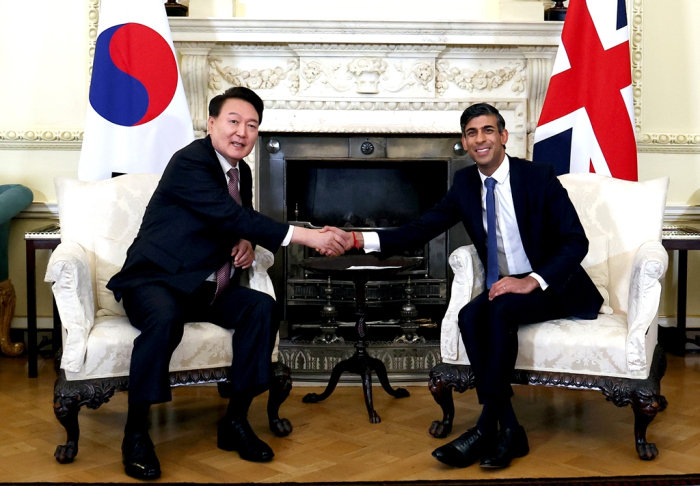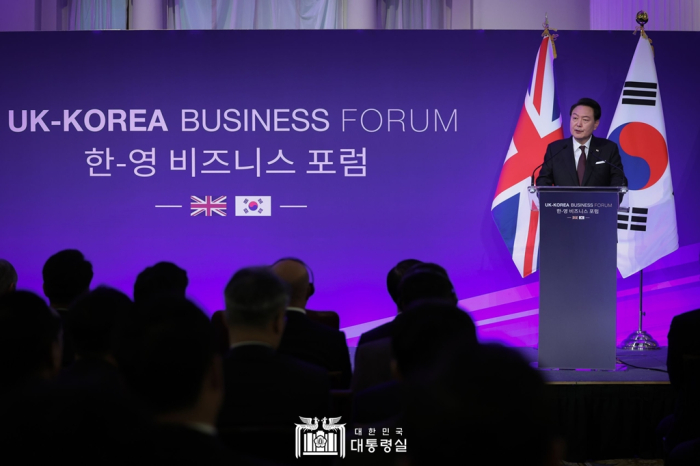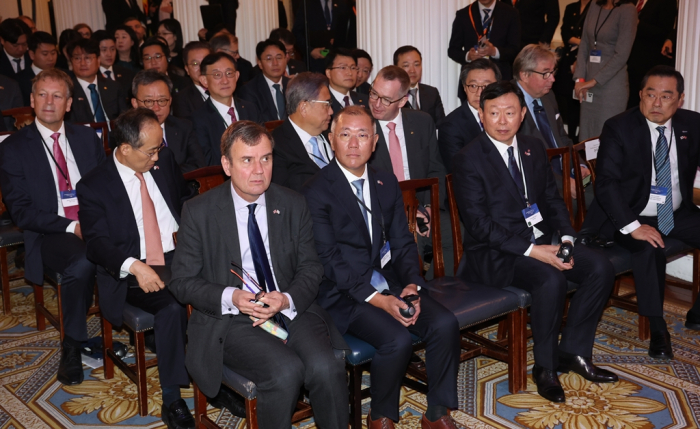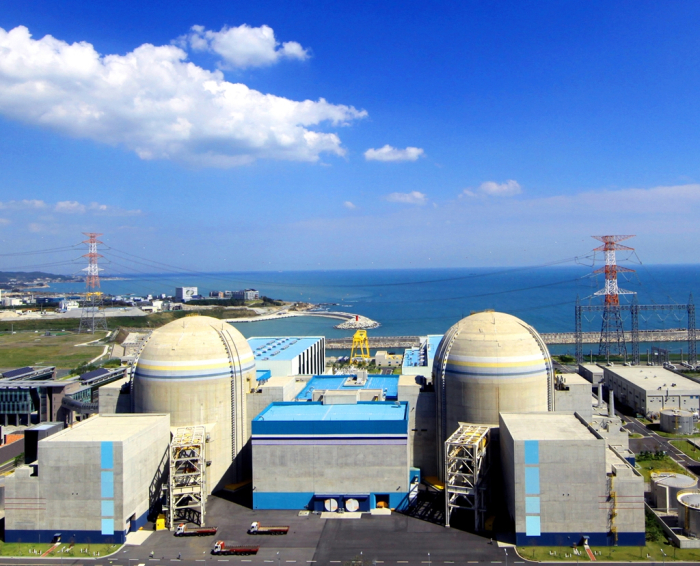Business & Politics
BP, Corio to invest $1.1 billion in S. Korea as Seoul-London ties deepen
Leaders of the two countries signed the Downing Street Accord to upgrade bilateral relations to their highest ever
By Nov 23, 2023 (Gmt+09:00)
4
Min read
Most Read
LG Chem to sell water filter business to Glenwood PE for $692 million


Kyobo Life poised to buy Japan’s SBI Group-owned savings bank


KT&G eyes overseas M&A after rejecting activist fund's offer


StockX in merger talks with Naver’s online reseller Kream


Mirae Asset to be named Korea Post’s core real estate fund operator



LONDON – British offshore wind power developer Corio Generation and energy giant BP Plc have agreed to invest a combined 1.5 trillion won ($1.16 billion) in wind farm projects in South Korea.
The two companies have submitted their investment plans to Seoul, according to Korea’s Ministry of Trade, Industry and Energy.
The announcement came during Korean President Yoon Suk Yeol’s four-day state visit to the UK that started on Monday.
Corio is developing eight offshore wind farms totaling 2.9 gigawatts in Korea, while BP plans to invest in offshore wind farms under development on the southern coast of the Asian country, and plans to expand its investment in Korea's renewable energy sector, the industry ministry said in a statement on Wednesday.
The investments are expected to increase demand for equipment made in Korea such as tower structures, turbines and power cables as well as support the local economy and create jobs, the ministry said.
The investment plans are part of a broader Korea-UK partnership signed during Yoon’s state visit.

DOWNING STREET ACCORD
On Wednesday, President Yoon and British Prime Minister Rishi Sunak signed the “Downing Street Accord (DSA)” during their summit meeting, which covers bilateral cooperation in a variety of sectors from the economy and finance to defense, security, semiconductors, nuclear power, artificial intelligence and advanced technologies.
Under the accord, the two countries agreed to upgrade their relations to a “global strategic partnership” from the current “broad and creative partnership” – forming what Seoul calls their highest-ever bilateral ties.
Yoon’s UK trip, the first foreign state visit hosted by the UK since the coronation of King Charles, marks the 140th anniversary of the two countries’ diplomatic relationship.
The two national leaders agreed to launch next year a financial consultative body, the Korea-UK Economic and Financial Dialogue, to discuss issues of mutual concern such as macroeconomic stability, fiscal policy and economic security.
The dialogue channel, to be managed by Korea’s finance ministry and the UK Treasury, is expected to boost Korea’s foreign exchange and financial markets, Seoul officials said.
The leaders also agreed to set up a consultative body on supply chains by the end of this year to ensure stable supplies of advanced technology-related materials, parts, equipment, essential pharmaceuticals, energy and other core minerals.

DEFENSE COOPERATION
In the defense and security sector, Korea and the UK agreed to launch a “two plus two ministerial meeting,” involving foreign ministers and defense ministers of the two countries. They also signed the Korea-UK Strategic Cyber Partnership to jointly respond to cyber security threats.
The accord stipulates their common stance on North Korea, including joint military exercises and a push for joint maritime patrols to enforce U.N. Security Council sanctions against Pyongyang’s nuclear and missile programs, as well as a shared opposition to weapons trade between North Korea and Russia.
NUCLEAR REACTOR PROJECTS, NEW FTA DEAL
The two countries also agreed to co-develop and export technology related to nuclear power plants and small modular reactors (SMRs).
Korea’s Trade and Industry Minister Bang Moon-kyu and his British counterpart Claire Coutinho will hold talks to work out the details of their nuclear energy cooperation, including the planning, construction, operation and dismantling of nuclear plants.

The UK has been aggressively pursuing nuclear energy in a push for nuclear power to account for a fourth of its entire electricity generation by 2050, up from 15% in 2020. The country was the first to commercialize nuclear power by building a plant in 1956.
Yoon and Sunak said their countries will soon begin annual high-level talks to revise and upgrade their bilateral free trade agreement (FTA).
The new FTA will build on the existing one that was signed in 2019 when the UK was preparing to pull out of the European Union through Brexit.
Choi Sang-mok, Korea’s presidential secretary for economic affairs, said changes to the FTA will be made to facilitate Korea’s electric car exports to the UK and open the two countries’ government procurement markets.
To promote personnel exchanges, the two countries agreed to raise the qualifying age limit for working holiday programs to 35 from 30 and the number of annual participants to 5,000 from the current 1,000, starting next year.
Write to Hyeong-Ju Oh and Han-Shin Park at ohk@hankyung.com
In-Soo Nam edited this article.
More to Read
-
 Business & PoliticsS.Korea-UK upgrade bilateral ties, sign deals on nuclear plants, chips
Business & PoliticsS.Korea-UK upgrade bilateral ties, sign deals on nuclear plants, chipsNov 22, 2023 (Gmt+09:00)
4 Min read -
 Leadership & ManagementSamsung’s Jay Y. Lee heads to Europe for partner meetup, Busan Expo
Leadership & ManagementSamsung’s Jay Y. Lee heads to Europe for partner meetup, Busan ExpoNov 20, 2023 (Gmt+09:00)
2 Min read -
 Leadership & ManagementHyundai’s Chung: 1st Korean awarded top UK Order from King Charles
Leadership & ManagementHyundai’s Chung: 1st Korean awarded top UK Order from King CharlesNov 15, 2023 (Gmt+09:00)
3 Min read -
 Business & PoliticsYoon, Korea’s No. 1 salesman, at BIE to drum up support for 2030 Expo
Business & PoliticsYoon, Korea’s No. 1 salesman, at BIE to drum up support for 2030 ExpoJun 13, 2023 (Gmt+09:00)
4 Min read
Comment 0
LOG IN


